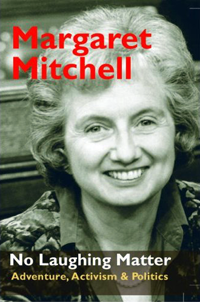
- No Laughing Matter: Adventure, Activism & Politics
- Granville Island Publishing (2007)
Even today, being a member of Parliament and a woman in Canada is a rare and difficult accomplishment. When Margaret Mitchell did it, one could count the number of women who made it to the House of Commons on two hands.
Mitchell held the seat of Vancouver East for 14 years as an NDP federal member of Parliament from 1979 to 1993, advocating for women, the poor, affordable housing and better social services.
How she got there, from growing up in small-town Ontario, to working with the Red Cross in Korea, to organizing community action in working-class neighbourhoods in Vancouver, to marrying a boisterous leftist Australian, is the basis of her memoir, No Laughing Matter: Adventure, Activism & Politics.
Mitchell's book describes not only her personal growth -- through ovarian cancer, discovering her anti-war politics, her budding feminism -- but the internal workings of the NDP, the ego and power struggles of Parliament Hill and the chauvinism of politicians, even within her party.
Speaking up for battered women
When the women of her party created a women's caucus and took charge of the party, ultimately electing Audrey McLaughlin as the first woman leader of the federal party, Mitchell was front-and-centre. Her book reflects the struggles the women faced in bringing their issues and their candidate to the fore.
"After the euphoria, the reality of rebuilding caucus relationships faced us. Audrey made sure those who had opposed her were not penalized for doing so. Dave [Barrett]'s supporters had key positions on the caucus executive, but they continued to undermine Audrey or her staff," she writes.
Mitchell's defining moment in parliament, and the namesake of the book, came when she broached the topic of violence against women in the House of Commons and was openly laughed at by male MPs.
As Mitchell tells it, "On May 12, I rose in the House to raise the urgent need for government action on a serious and widespread issue. 'The parliamentary report on battered wives states that one in 10 Canadian husbands beat their wives regularly,' I began. Before I could continue, an uproar of male shouts and laughter erupted, making it impossible for me to be heard. A nearby Tory joked, 'I don't beat my wife. Do you, George?' When the Speaker finally got order, I rose again in fury. 'Madam Speaker, I do not think this is a laughing matter. What action will the minister responsible for the status of women undertake immediately at the federal level to protect battered women?'"
The big issues
Because Mitchell served in Parliament through the Trudeau and Mulroney years, No Laughing Matter is an intriguing book for those looking for the other side of the NAFTA agreement, the Charter of Rights and Freedoms and the failed Meech Lake Accord and Charlottetown Agreement.
Her personal life is also incredible. She travelled the world, met and married a man abroad, beat cancer and pushed social issues onto the agenda in Vancouver over and over again.
Unfortunately, the adventure of Mitchell's life is dampened by the weakness of her storytelling in this book. By using a style far too similar to that of a speech on the floor of our Parliament, her courageous life seems dull.
A barrage of acronyms, rushing through decades of struggles, No Laughing Matter is like a grocery list of accomplishments that she must get out in an allotted space. There is no delving deeply into the emotion of the time; the reader never truly meets any characters.
For example, Chapter 18, "Canada's First Woman Leader" is six pages long and covers the Montreal massacre, Audrey McLaughlin's rise to party leader, the Oka crisis and the first war in Iraq, all presented in a list of subheads and summaries. For the tumultuous time that it was, Mitchell would have done better taking 60 pages to describe it, rather than six. Too often, this is how her book reads.
Important resource
For a party-politics history buff, this may be at least a useful tool in research. Mitchell carefully documents pretty much everything she did in her political career: who she spoke with, who her advisors were, what policy papers she worked on, what she discussed in parliament, but sadly she also rushes through the more emotional and historically interesting parts of her life.
The content is thrilling, but the storytelling isn't. No Laughing Matter is informative, but perhaps best classified as reference, rather than recreational, reading.




